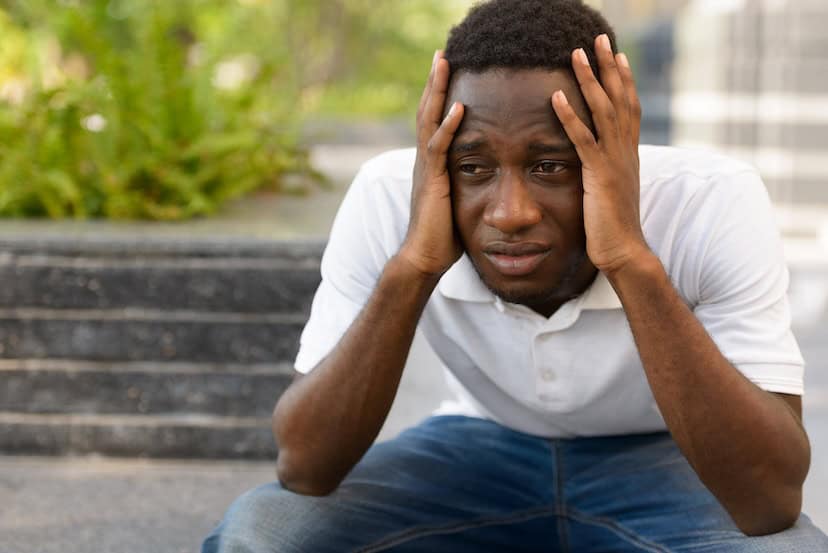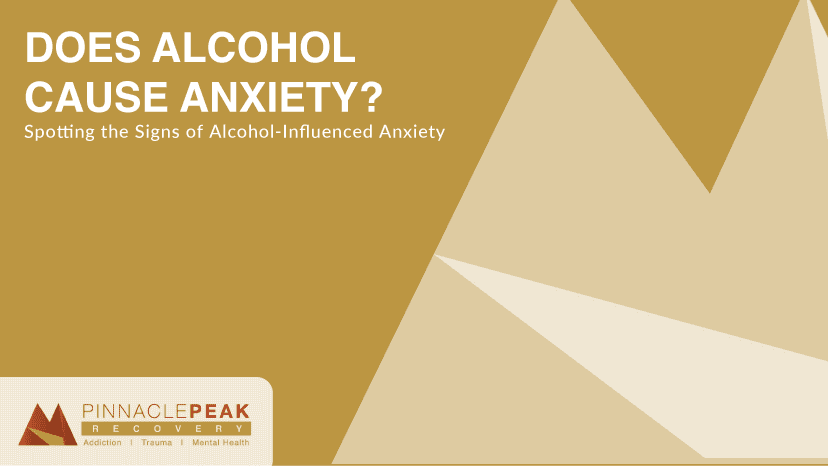If someone presented you with a piece of cake, but told you that eating it would negatively affect your mental health, would you still eat it?
For the 1 in 3 people in Arizona who are dealing with depression and anxiety, this is their truth about alcohol. Any and all alcohol use can directly impact your mental health, but how?
Our team at Pinnacle Peak Recovery gets questions like this all of the time. We want to help our community by answering these questions so you can make informed decisions about your health. Today we’re going to answer the question, “Does alcohol cause anxiety?”
What Is the Relationship Between Alcohol and Anxiety?
There are two primary categories of substances – depressants and stimulants. A stimulant is something that speeds up the central nervous system and other systems in the body. Adderall and coffee, for example, are both stimulants.
Alcohol, on the other hand, is a depressant. This means that it slows down the body, often leading to calming effects. How, then, can something that slows down the body be tied to anxiety?
It’s not what alcohol does to the body while you’re drinking, but rather the side effects after that contribute to anxiety. As your body gets accustomed to the slower state caused by drinking, the removal of that can make our normal pace feel fast. These “faster” things such as heart rate, breathing, thinking, and more can mimic the feelings of anxiety.
Does Alcohol Cause Anxiety or Worsen Existing Anxiety?
Alcohol use and mental health often go hand-in-hand. While sometimes people dealing with untreated mental health might utilize alcohol to self-medicate, alcohol can also contribute to the development of mental health conditions.
With many health conditions, you can become more susceptible to certain side effects of medications, substances, and more if they directly relate to your condition. For example, people with seizure disorders should be wary when drinking alcohol, as alcohol use can cause seizures. Those who are predisposed for seizures become at higher risk than those who aren’t.
This can also be applied to anxiety. Those without anxiety disorders are still at risk of experiencing anxiety-related side effects, but someone with an anxiety disorder is at higher risk.
What Is “Hangxiety?”
If you’ve heard the term “Hangxiety” before, you might have deduced that it’s a combination of the words “hangover” and “anxiety.” This term not only refers to the anxiety symptoms you can get because of your reaction to alcohol but also anxiety caused by the stigma surrounding alcohol use.
As we touched on earlier, the experience of your body recovering from alcohol can feel akin to anxiety. This is due to you being accustomed to the slower sensations present when alcohol is in your body. As your body returns to its normal state, it can feel fast by comparison, mimicking the sensation of anxiety.
There are times when you might experience anxiety after drinking that’s unrelated to the physical side effects. Whether you promised a partner you wouldn’t drink anymore, or you wake up and realize you made some bad choices while drunk, a lot of societal things can contribute to anxiety.

How to Spot the Symptoms of Alcohol-Related Anxiety
The most common time that someone will experience alcohol-related anxiety is during alcohol withdrawal. Being able to identify the side effects of both anxiety and alcohol withdrawal can help you better pinpoint the cause of your anxiety.
On its own, anxiety’s most common side effect is being on edge, or an impending sense of doom. In addition, people with anxiety might experience nausea, increased heart rate, sweating, shakiness, and difficulty thinking.
During alcohol withdrawal, nearly every symptom of anxiety can occur. Having the full list of side effects can help you separate these anxiety-related side effects from those of alcohol withdrawal.
| Alcohol-Withdrawal Only | Both Alcohol-Withdrawal & Anxiety |
|---|---|
| Depression | Trouble thinking |
| Mood swings | Nausea |
| Headaches | Rapid heart rate |
| Fever | Irritability |
| Fatigue | Increased sweating |
| Seizures | Shakiness |
Alcohol-Withdrawal Only
- Depression
- Mood swings
- Headaches
- Fever
- Fatigue
- Seizures
Both Alcohol-Withdrawal & Anxiety
- Trouble thinking
- Nausea
- Rapid heart rate
- Irritability
- Increased sweating
- Shakiness
Alcohol-Related Panic Attacks
Whether you have an anxiety disorder or not, anyone can experience a panic attack.
A panic attack is a sudden onset of physical stress, usually resulting in hyperventilation, sweating, trembling, heart palpitations, nausea, and numbness. As you can see in the chart above, many of these side effects are similar to withdrawal and anxiety. With panic attacks, these feelings are often much more intense and overwhelming.
If you notice someone who seems despondent, with rapid breathing and shakiness, they might be having a panic attack. You can help them, and here are a few tips on how to:
- Talk calmly to them
- Be predictable, you can go as far as to talk to them about what you’re doing
- Remind them of where they are
- Ask them if they need help
- If they want to, help them find a quiet place to move to
- Offer them physical items or touch to help ground them
Remember, panic attacks are temporary. The most important thing you can do is be calm and be there for them.
What Can You Do if Alcohol Is Causing You Anxiety?
If reading this article reminds you of yourself or someone in your life, what can you do about it?
When someone has anxiety and an alcohol use disorder, the two need to be treated together. This means that in order to address your anxiety, the alcohol consumption needs to stop. If you try to treat one without the other, it’s not likely to work in the long run.
This is because of how they’re connected to each other. If you started drinking to treat your anxiety, stopping drinking won’t fix your anxiety. If you developed anxiety because you were drinking, treating your anxiety won’t stop your pattern of alcohol use.
The best way to address alcohol-related anxiety is to seek treatment at a facility that will address both of your concerns.
How to Manage Alcohol-Induced Anxiety at Home
Even though your best approach to managing alcohol-induced anxiety is through a treatment program, this doesn’t mean that there aren’t ways to minimize the symptoms at home. These tips are especially helpful for those in long-term recovery when you encounter obstacles in your day-to-day life.
- The most important thing is to hydrate. Dehydration can cause things like heart palpitations, anxiety, panic attacks, constipation, and fatigue. After a night of drinking, your body is almost always dehydrated.
- When managing mental health, support is greatly beneficial. Whether this comes from loved ones or fellow peers in recovery, you’re not alone in your journey.
- Finally, try different activities to identify which ones best help you during periods of anxiety. The most common practices include taking a walk, yoga, breathing exercises, journalling, petting an animal, and more. There’s no wrong way to soothe yourself, so don’t be afraid to try different things or ask others what works best for them.

Finding Treatment Options for Alcohol and Anxiety in Arizona
If you’re looking for rehab for alcoholism, how can you know where to start? When you’re dealing with both an alcohol use disorder and anxiety, it’s important to find a place that will help you address both.
When someone has two or more conditions that are so intertwined, it is referred to as a co-occurring disorder. Finding proper co-occurring disorder treatment ensures you get the support and care you need to set you up for long-term success in your recovery.
Here at Pinnacle Peak, we can help you with that. We offer evidence-based treatment for alcohol use disorders and mental health. We want to see you reach your healing goals and will provide you with support every step of the way. If you’re ready to get started today, or you have any questions, just give us a call at 866-377-4761.
Clinical Excellence | Compassionate Care | Family Feel
FAQs About Alcohol and Anxiety
How does alcohol interact with anti-anxiety medications?
Anti-anxiety medications fall into the same category as alcohol – they’re both depressants. This means they slow down your body, including your breathing and heart rate. When these are taken at the same time you run an increased risk of overdosing.

